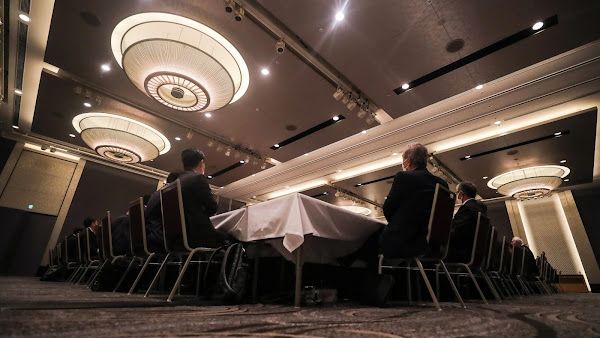The effort by the Asia Pacific Group to disclose the discussions is not necessarily aimed at demystifying it to critics, however. Instead, the press has been invited to highlight a rift that may be emerging between Asia and the other wings of the organization.
We feel that the U.S. policy toward Asia, especially toward China, has been narrow-minded and unyielding. We want the people in the U.S. to recognize the various Asian perspectives, said Masahisa Ikeda, an executive committee member of the Trilateral Commission. Ikeda has been named the next director of the Asia Pacific Group, and is scheduled to assume the position next spring.
If the Tokyo gathering demonstrated anything, it is that Asia’s elites are nervous that the world is heading in the wrong direction, fueled by the intensifying competition between the U.S. and China and the decoupling that awaits. And the problem, in the view of many of the participants, is America. Huntington’s injunction against
Ken Moriyasu, Mariko Kodaki, Shigesaburo Okumuraan excess democracyis still embedded in the thinking of many of the Trilateral Commission’s members. But this time, it’s the U.S. penchant for exporting its ideology that is the main concern for many.
Fascinating article about a long-standing, but enigmatic group of prominent figures. It reads fairly like a conspiracy, one of those stories you hear about the ‘deep state’ pulling the strings of global politics from the shadows, but the message remains valid and concerning. As reported in several occasions, Asian countries are uncomfortable with US’ insistence that they should be taking sides in their newly-found drive to counter China’s influence in the region. And with good reason: China’s neighbors have much stronger economic ties to Beijing than to Washington, and the US doesn’t seem willing to offer any trade incentives of their own to compensate for the lost business with China.

The decoupling rhetoric and increased economic pressure on China through sanctions may induce a fracture of the global economy into two (or more) blocks, a situation that would disadvantage smaller and developing states. With their internal energy sources and large consumption market, the US could weather the – self-inflicted – disruptions to global trade; as a large importer of energy, China may have a harder time, but it could conceivably cover its demand from Russian sources, once new gas pipelines from Siberia come online; smaller countries though would find themselves squeezed between the two behemoths, without an overarching authority governing world trade, having to either constantly balance their conflicting demands or choose a bloc and renounce on important supplies and customers on the opposing side.
A lot of people argue that overuse of sanctions is contributing to bloc formation.
— Esfandyar Batmanghelidj (@yarbatman) March 5, 2023
This tweet nicely demonstrates how many in the US policy establishment want that outcome. Sanctions will be used to *accelerate* bloc formation and get vassals in line to keep the US ahead. https://t.co/AZNBUoIkxh
I’m sure most people in the West would simply brush such concerns aside with a simple: who cares, as long as we are on the right side of the divide? The thing is, considering a longer perspective, I’m not convinced we would be on the right side of an economic Cold War. The shrinking industrial base in the West and growing demand for rare earths needed for renewable energy sources are core weaknesses that shouldn’t be underestimated. China plays central roles in both cases, and could heavily disrupt supply chains if they decide to retaliate against US sanctions. And if we’re pushing people to pick sides, what makes us so sure they would choose ours – especially on the African continent, with its distrust of former colonial powers?
according to the IER, the United States is much more dependent upon China for rare earth minerals than it ever was on the Middle East for oil supplies, sourcing about 80 % of its rare earth requirements from China, compared to a high of 23 % of imported oil from the Middle East in 2001.
Not all countries are complaining about the return of geopolitical competition. While East and Southeast Asia feel forced to choose by U.S.-China decoupling, India, for example, has benefited massively from a bidding war between Moscow and Washington for its allegiance. During the sessions, Indian members spoke of the windfall benefits the U.S.-China competition is gifting the subcontinent.
India has been getting a triple discount on oil, the Indian analyst explained. While India purchased discounted oil from Russia, the U.S. looked the other way, trying not to alienate New Delhi for geopolitical purposes.As the Russian share of our oil market increased, the Saudi Arabians and the Iraqis, who are also interested in India for geopolitical and market reasons, began to undercut the Russian price, he said.
At one point we were getting discounted Russian oil, further discounted oil from Saudi Arabia and a third discount from Iraq.
A South Korean academic said:
India can’t continue to be on the sidelines of international institutions. Otherwise India will be the next China, imposing their own values and priorities on the world.
Post a Comment